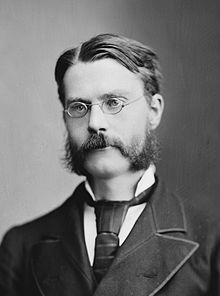Edward Singleton Holden
Edward Singleton Holden (born November 5, 1846 in St. Louis , Missouri , † March 16, 1914 in West Point , New York ) was an American astronomer .
Holden first studied mathematics and astronomy in Washington, DC and graduated there. In 1866 he entered the US Military Academy at West Point as a cadet and was assigned to the Artillery Lieutenant in 1871 and the Engineer Corps in 1872. At the same time he worked as a teacher at the military academy. In 1873 he resigned from the army and was appointed professor of mathematics in the navy and as such the naval observatory in Washington ( United States Naval Observatory ).
As an observator in Washington, he was mainly occupied with observations on the new 26-inch telescope , with his main interest being the nebulae ( galaxies and star clusters ). His work Monograph of the Central Parts of the Nebula of Orion (Washington 1882) dates from this time . Herein he proves that the Orion Nebula has probably not undergone any change in shape since 1758, but in brightness - an early indication of recent star formation .
In 1881 Holden was appointed professor of astronomy and director of the Washburn Observatory at the University of Wisconsin at Madison and in 1886, succeeding WT Reid, was appointed President of the University of California and director of the Lick Observatory . He left this office in 1898; He remained university president until 1888.
In 1885, Holden was elected to the American Academy of Arts and Sciences and the National Academy of Sciences . In 1897 he was accepted into the American Philosophical Society .
Holden is also a co-founder of the Astronomical Society of the Pacific . Later (1901) he went back to West Point and worked there as a librarian so that he could devote himself to scientific writing in peace.
Edward Singleton Holden died March 16, 1914 as a librarian at West Point. The lunar crater Holden , the Martian crater Holden , the asteroid (2974) Holden and possibly also the asteroid (872) Holda are named after him.
literature
- Brüggenthies, Wilhelm; Dick, Wolfgang R .: Biographical Index of Astronomy / Biographical Index of Astronomy . Leipzig 2017, p. 522
- Schmadel, Lutz D .: Dictionary of Minor Planet Names . 5th ed. Springer, Berlin 2003, ISBN 3540002383 (English) Preview on Google Book Search
Web links
- Publications by ES Holden in the Astrophysics Data System
- Obituaries for ES Holden in the Astrophysics Data System
- Edward Singleton Holden in the database of Find a Grave (English)
Individual evidence
- ↑ Book of Members 1780 – present, Chapter H. (PDF; 1.2 MB) In: American Academy of Arts and Sciences (amacad.org). Retrieved April 3, 2018 .
- ^ Member History: Edward S. Holden. American Philosophical Society, accessed October 2, 2018 .
| personal data | |
|---|---|
| SURNAME | Holden, Edward Singleton |
| BRIEF DESCRIPTION | American astronomer |
| DATE OF BIRTH | November 5, 1846 |
| PLACE OF BIRTH | St. Louis , Missouri |
| DATE OF DEATH | March 16, 1914 |
| Place of death | West Point , New York |
